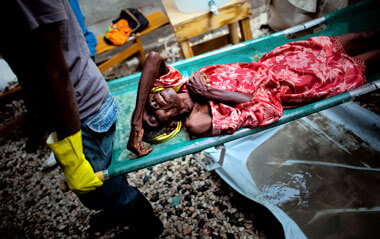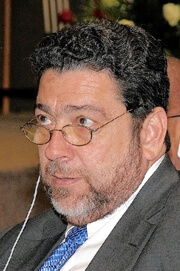A few years ago when international prices for oil and gold were high, the economy of Dutch-speaking Suriname was at its healthiest since the 1970s, with Central Bank foreign reserves topping $1B, foreign direct investment in bauxite and the hotel sectors peaked and hope for the future abounded.
Now with rates for the Caribbean Community member’s two main exports tanking, the economy is in the kind of tailspin that has not been seen since the 1980s when the military toppled the elected civilian administration and tried to run the country with handpicked favorites.
Today Suriname’s only avenue for economic hope and salvation appears to lie with international multilateral financial agencies such as the International Monetary Fund (IMF) and banks of similar ilk.
In the past week, the administration of President Desi Bouterse announced a tough deal with the IMF to borrow nearly $500M on a two-year standby arrangement with the fund as foreign reserves have dried up, the exchange rate for the Surinamese dollar is devaluing daily and as companies consider laying off hundreds of workers.
Bouterse who won a second five-year term in general elections in May 2015, says that the country of about 500,000 people, sharing borders with Guyana, French Guiana and Brazil, now has no choice but to turn to borrow internationally as the economy is virtually bankrupt.
The economy depends largely on oil, bauxite and gold exports all of which have been taking a beating on the international market in recent years. Other key sectors include rice and bananas with rice exports being the healthiest because of a special export barter arrangement with Venezuela.
But critics like main opposition leader Chan Santokhi are laying the blame for a near bankrupt economy squarely at the feet of the administration of Bouterse, arguing that Surinamese will only accept the fact that hardships have accrued from weak prices for bauxite, oil and gold. The remainder of the economic management problem must be linked to rampant corruption.
He says authorities have done nothing to stymie corruption and minimize or eliminate wasteful spending by a slew of state companies that are bleeding the treasury.
“The government has been deliberately wasteful and corrupt,” says the former police chief who now heads the main Indo Hindustani Party. “Despite the falling prices of oil and gold on the international market, bad policies and corruption have continued to be destructive to the economy.”
He argued, as well, that fact that authorities had to approach and tie up a deal with the IMF is proof that the country is in dire economic straits.
Outside of the loan from the IMF and the stringent wages freeze and other rules that accompany an IMF agreement, Bouterse says another $900M is expected from the Inter American Development Bank and the Caribbean Development Bank in the coming weeks.
Adding to all its woes are daily fluctuations of the local currency, taking up the prices for imports and imposing hardships on ordinary citizens.
Authorities last year devalued the currency and are moving to allow it to float on the market in much the same with Guyana, Trinidad and Jamaica have done for quite a while, Guyana since the late 80s.
To go along with the loan, the IMF has already ordered an audit of the Central Bank, stopped it from dumping hard currency onto the market and has ordered it to reduce the level of financial auctions it was fond of doing previously.
Additionally, it wants authorities to look at subsidized electricity rates to eliminate them in the future as part of what it calls necessary belt tightening measures that will be a part of life in the country in the coming years.

























